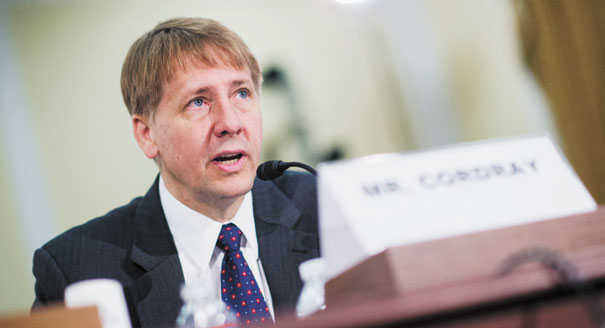Time to Reign in the CFPB Czar

By Henry Meier, Credit Union Association of New York
At the risk of being accused of being a lackey for “The Man,” count me among those who feel that the CFPB exercises too much power to vest it all in one person. The credit union industry and, ultimately, the American consumer would benefit from structural reforms that make it more difficult for the Bureau to enact regulations and issue guidance. If we don’t, every tree in North America is in danger of being chopped down and every compliance officer runs the risk of being buried alive in paperwork.
Just so you know where I am coming from, I’m not one of those “the world would be better without regulation” types. The Great Recession showed what happens when regulations don’t keep up with the times. Plus, Richard Cordray not only praises credit unions but has actively moved to exempt them from at least some of the Dodd-Frank mandated regulatory burden. It’s a real testament to his character that in a capitol filled with people who would impeach their Grandmother to curry favor with their constituents no one has questioned Cordray’s integrity or the skill with which he has launched the agency.
The problem is that Richard Cordray won’t always be the director. And any agency which is given the responsibility and power to pump out thousands of pages in regulations in a few weeks needs to be slowed down.
My question for those persons resisting CFPB reform today is this: are they willing to put up with a conservative director tomorrow? Remember the same powers that allow the Bureau to oversee almost every aspect of consumer lending can be used by a future director to scale back protections that he/she feels are overly burdensome or unnecessary. Would you be in favor of a director who, for example, concludes that federal law hurts consumers by making it too difficult for lenders to foreclose on property resulting in higher borrowing costs for the American public? After all, Ronald Reagan once appointed a man named James Watt to be the Secretary of the Interior who didn’t much care for the outdoors but who felt there were too many environmental regulations.
Proponents point out that other agencies, like the OCC, vest rulemaking authority in a single individual. True enough. But, the last time I checked, regulated national banks have the option of converting to state charters; the OCC isn’t authorized to oversee both bank and nonbank actors and it doesn’t have the authority to promulgate regulations on issues ranging from student lending to indirect automobile lending to the Truth in Lending Act. In fact, I would challenge anyone to name a person with greater authority to unilaterally act on behalf of the American public other than the President. Not even Ben Bernanke can wake up and lower interest rates on a whim.
There is, of course, a middle ground between those who would neuter the agency in the name of structural reform and those who think it’s great to have a single person exercising regulatory oversight over every financial product in the country. Let’s keep the CFPB funded the way it is now so that it isn’t dependent on congressional appropriators who have too often shown themselves to be more interested in protecting bankers than in protecting consumers. Also, let’s still have a director for the agency. But let’s give him one vote on an appointed five member board that would have to approve regulatory actions by a majority vote.
Would this slow down the promulgation of new regulations? Yep, but that is a good thing. There are only so many major changes any industry should have to absorb at one time. Would proposals get watered down? Absolutely, but if a proposal can’t get the approval of three people it probably isn’t a good idea in the first place. Besides, Congress will always be able to pass consumer protection laws if and when the CFPB refuses to act. I can dream a little, can’t I?

